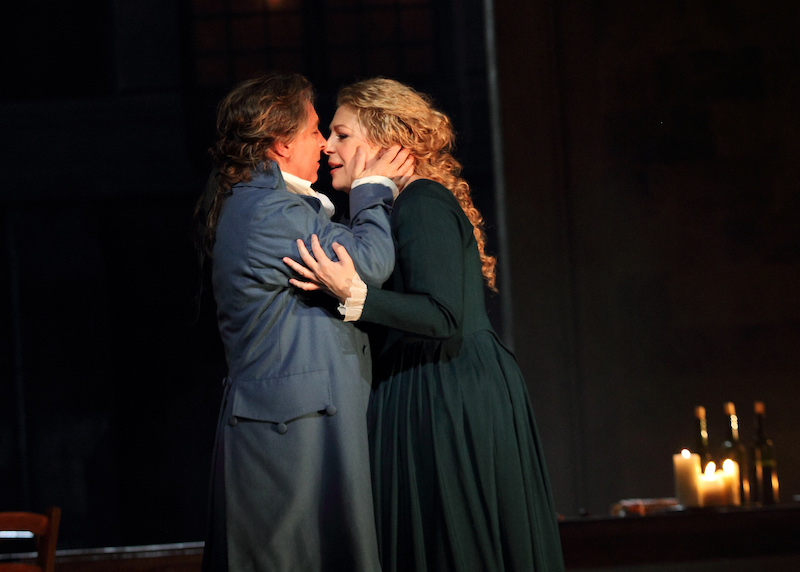Andrea Chenier, Royal Opera House
In making the title role of Umberto Giordano’s Andrea Chénier the vehicle for his hundredth Covent Garden appearance, Roberto Alagna has made a wise choice. As a born singer-actor, he’s been able to develop his dramatic powers to compensate for the gradual loss of the youthful vocal gleam which made him such a star. But the good news is that although his sound now has a hard edge, he can still deliver the goods thanks to the security of his phrasing and vocal control.
André Chénier was a poet-satirist who fell foul of Robespierre and was guillotined in 1794; the formal beauty and moral fury of the poem he penned on the eve of his execution makes one of the most chilling death-row utterances ever. An Italian translation of that poem’s first line – comparing the sunset of his life with the end of a fine spring day – provides the aria which Giordano’s character sings as he waits to mount the scaffold.
 Roberto Alagna as Andrea Chénier and Sondra Radvanovsky as Maddalena di Coigny ©ROH/Catherine Ashmore
Roberto Alagna as Andrea Chénier and Sondra Radvanovsky as Maddalena di Coigny ©ROH/Catherine Ashmore
However, answering late nineteenth-century audience requirements, this Chénier dies for love, bewitched by Maddalena, a beautiful young aristocrat who sends him fan letters signed ‘Hope’, and whose mortal danger moves him to throw up everything to save her. Following in the footsteps of Domingo, Carreras, and Kaufmann, Alagna is required to begin with a very slow burn, but to build to an ecstatically uplifting conclusion.
Now in its first revival, David McVicar’s cosily old-fashioned but scrupulously researched production works smoothly under Daniel Oren’s conducting, even if the acting under revival director Marie Lambert is at times wooden. The palace of the gentry and the pullulating streets are energetically brought to life, if in benign soft focus; the joyous libertinage of the exotically-dressed merveilleuses – notably Christine Rice as a charismatic Bersi – is McVicar’s way of reminding us that for some people the Revolution was fun. The courtroom scene remains queasily believable.
But Alagna is also supported by two outstanding singers in the other key roles. The Greek baritone Dimitri Platanias brings nobility to the character of Carlo Gérard, a rival in love who wrestles with his republican conscience over whether to shop Chénier. And the American soprano Sondra Radvanovsky makes a stunning Maddalena, both dramatically and vocally: in the can-belto duet which carries the condemned pair off to their deathly union, her majestic voice eclipses Alagna’s.
The librettist for this opera, Luigi Illica, went on to write the libretto for Puccini’s Tosca, a much greater work for which he re-used a central idea from this one. Watching Radvanovsky fight for her virtue in an emotional duel with Gerard, one remembers how splendidly she incarnated Tosca in her sanguinary duel with Scarpia. It would be good to see that again.
★★★★